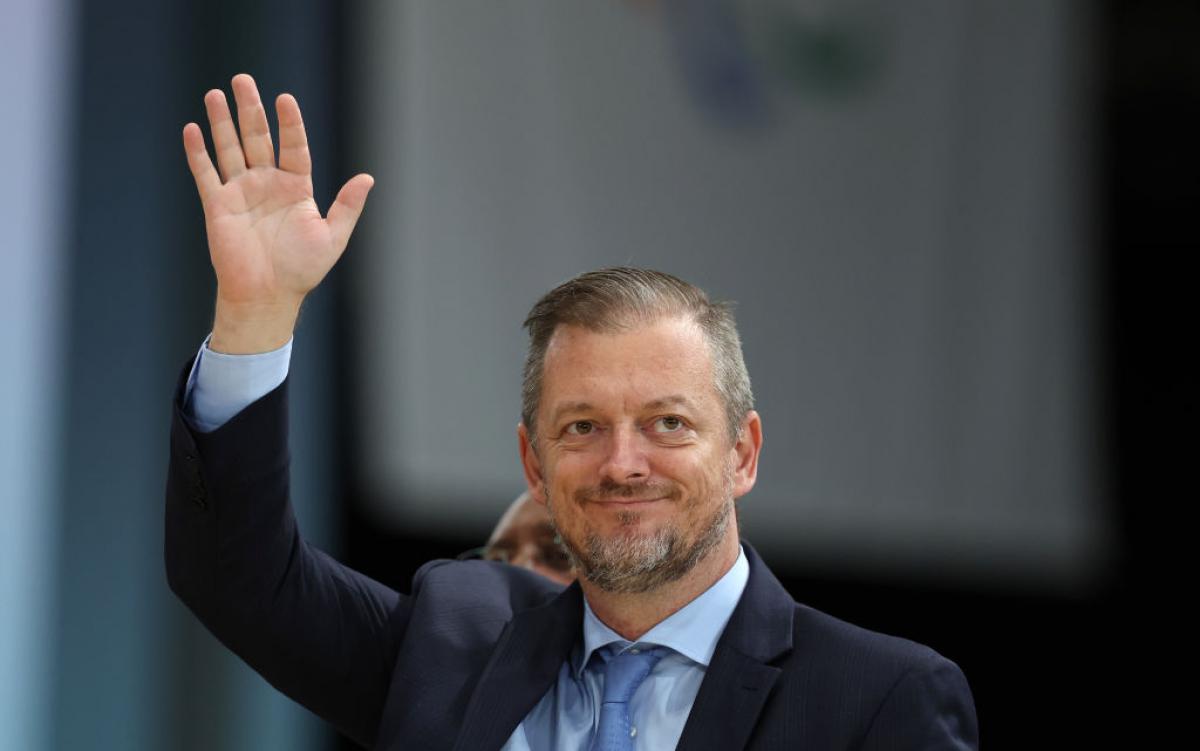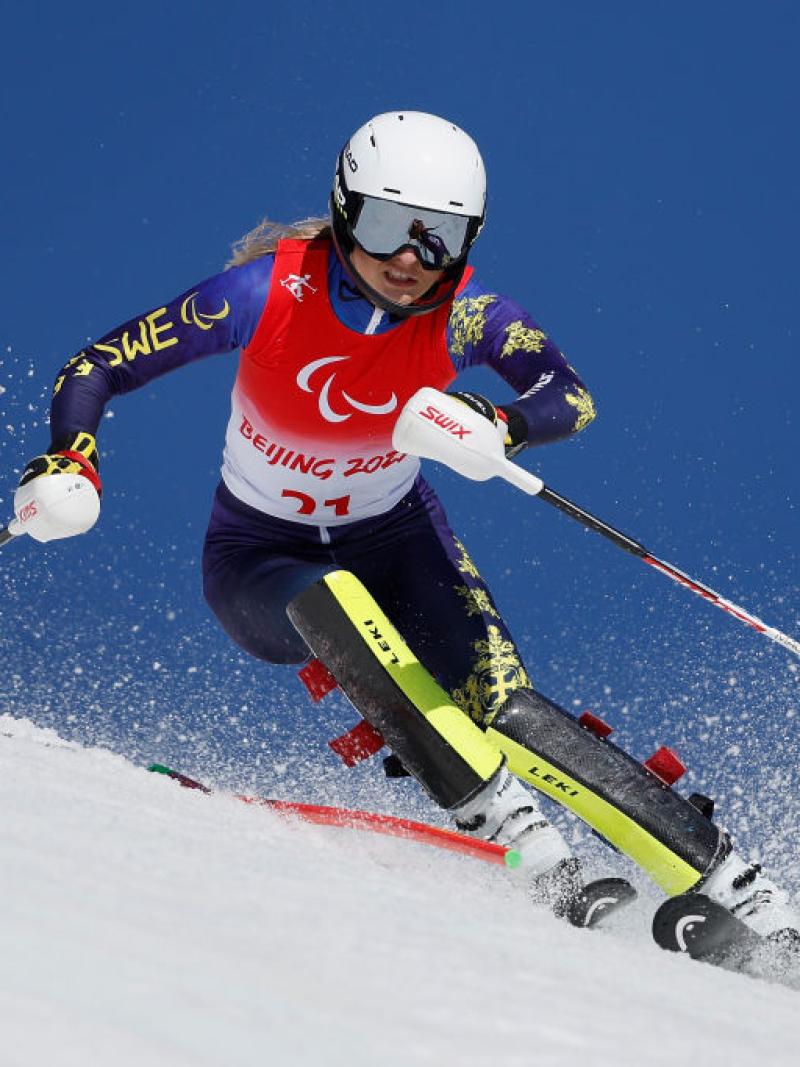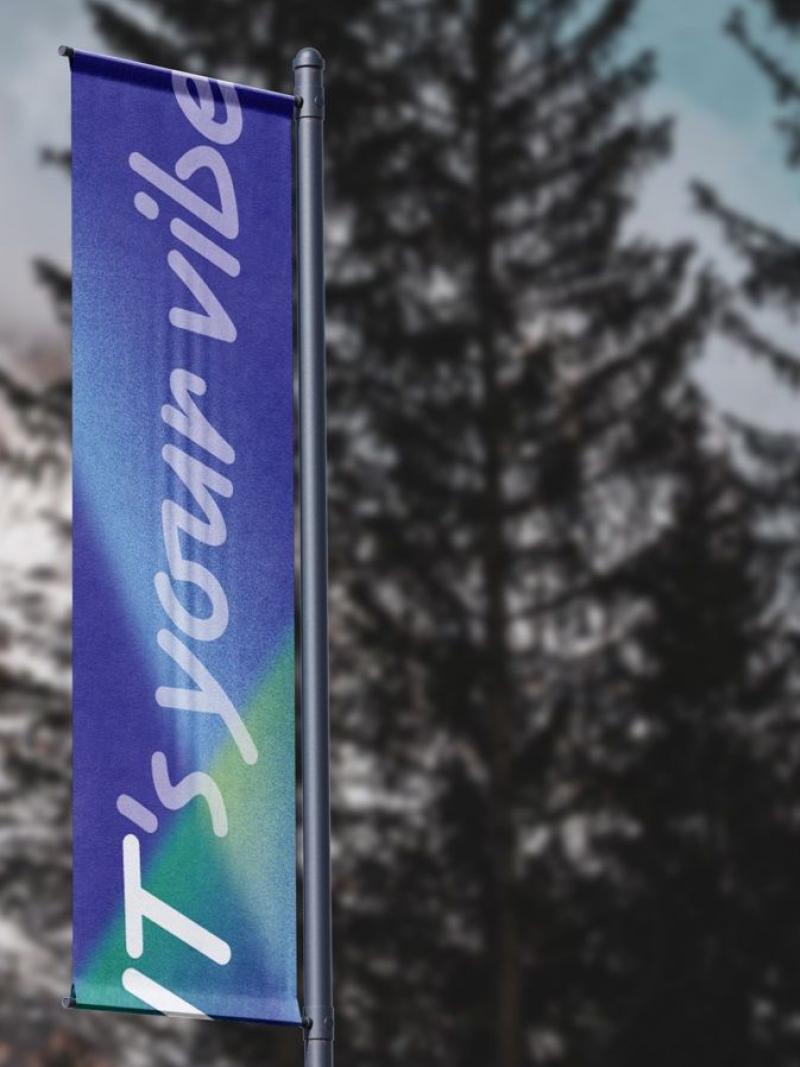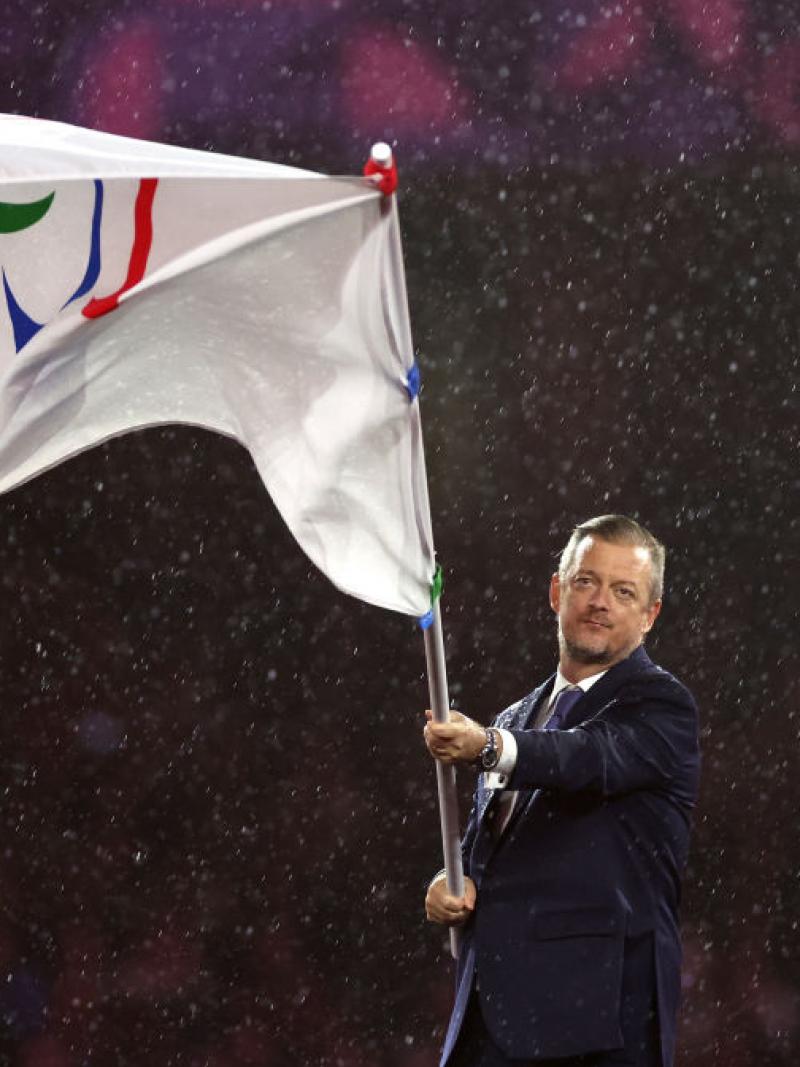Q&A with IPC President: Milano Cortina 2026 is an “opportunity of a lifetime”
“The sport is going to be spectacular, the scenario and the setting will be incredible, and I’m also excited about the legacy” 06 Mar 2025
In one year, the Milano Cortina 2026 Paralympic Winter Games will begin with a stunning and historic Opening Ceremony at the Arena di Verona, a venue built almost 2,000 years ago.
The Paralympic Winter Games will take place between 6 and 15 March 2026, featuring 79 medal events across six Para sports – Para alpine skiing, Para biathlon, Para cross-country skiing, Para ice hockey, Para snowboard and wheelchair curling. Up to 665 athletes from 50 National Paralympic Committees (NPCs) are expected to compete at the “most beautiful Paralympic Winter Games” ever.
We spoke to International Paralympic Committee (IPC) President Andrew Parsons about what he looks forward to at the Games.
IPC: Today is one year to go until the Milano Cortina 2026 Paralympic Winter Games. How excited are you to reach this milestone?
IPC President Andrew Parsons: I’m very excited about the Milano Cortina 2026 Paralympics. I think these Games are going to be the most beautiful Paralympic Winter Games ever. Many of the venues will be in the Dolomites, which is even reflected in the logo of the Games.
It will be in an incredible setting, but I’m more excited about the performance of the athletes, as we have seen in the last seasons. I would say that there was a big jump that Paralympic winter sports had between PyeongChang (2018) and the Beijing (2022) Games. The young athletes who won gold medals in Beijing will be more mature now for Milano Cortina. And of course, the performance of China will force all the other nations to try to cover them. I think in terms of the level of sport, China really helped raise the bar.
I think the sport is going to be spectacular, the scenario and the setting will be incredible, and I’m also excited about the legacy. We are already seeing a good legacy from these Games.
IPC: Ticket sales for the Games have just started. Milano Cortina 2026 will see spectators return to the venues at a Paralympic Winter Games for the first time in eight years. What does this mean for athletes and the Paralympic Movement?
AP: I’m really excited to have spectators back. Sport is meant to be performed in front of spectators.
If you think it was only the Beijing edition (that did not have spectators because of the pandemic), but if you put that together, it is eight years (from PyeongChang 2018 to Milano Cortina 2026). This is a generation when it comes to sport. It will be fantastic to have spectators back again in an incredible scenario, cheering for incredible athletes.
We hope to see very great numbers in ticket sales. They are very affordable – nearly 90 per cent of the tickets are EUR 35 or less, so it’s an opportunity of a lifetime for everyone to see spectacular sport in an incredible setting, and again, a sport that changes lives. It’s educational and you can bring families, you can bring your kids to see these inspirational athletes. It can be the other way around – we know reverse education where kids educate their parents sometimes.
I’m really looking forward to seeing as many spectators as possible at Milano Cortina 2026.
IPC: What can fans expect at the Games?
AP: You will see incredible sport. You will see things that will defy what you think is possible.
Athletes, including those with vision impairments and wheelchair users, coming down a slope at 100 kilometres per hour. The sophistication of the tactics and the strategy behind wheelchair curling. Athletes always do things that we don’t anticipate and it’s incredible to see the thinking, the strategy and the skill behind it.
You will see brutality in the best meaning of the word in sports like Para ice hockey. It is incredible to see the energy and the speed. If you blink, you will miss something very important in the match because of the intensity of it.
And then you have sports that require stamina like Para cross-country skiing and Para biathlon. It is incredible to see the stamina, the resistance and the strength. Athletes are going uphill and downhill, long distances, and in biathlon, they still need to shoot and be accurate.
It’s the whole package that the fans can enjoy. And again, it’s incredible sport that is also transformational.
IPC: There will be people watching Paralympic winter sports for the first time at Milano Cortina 2026. Can you share your memories from your first Paralympic Winter Games?
AP: I attended Vancouver 2010 but only the board meeting because my daughter was born two weeks before. Sochi 2014 was my first real experience with the Paralympic Winter Games, and it was just amazing.
I don’t come from a country with a tradition in winter sport. But Sochi was the very first time that Brazil competed at a Winter Games. I was learning a lot and it was an incredible experience. To see ice sports in Sochi - Para ice hockey tournament in a packed venue and curling was something new and learning the strategy behind the games and the tactics - was amazing.
And then going to the mountains, and then standing in the Medals Plaza, which was absolutely new to me, because I was coming mainly from summer events where you have podiums at venues. The concept of a Medals Plaza and the festivities around it were all very new and made an impression on me.
I think the Winter Games bring something very special to the Paralympics when it comes to challenging perspectives. When someone thinks about persons with disabilities, probably the first thing that comes to mind is not an athlete with a vision impairment going downhill at 100 kilometres per hour. It’s an extreme sport to some degree with the speed and everything. But a person with a disability can do it incredibly well if given the opportunity.
It’s a metaphor of what we want in every aspect of society.
IPC: What do you believe the legacy of the Milano Cortina 2026 Games will be?
AP: I think it’s a combination of things. Of course, when you go to different municipalities like Verona, Milano, Cortina, the regions of Trento and so on, they have some things in common. For example, there is a strong focus on accessible tourism, which I think is something that any touristic city in the world should be looking at. Persons with disabilities are also tourists. This is a chance for them to accelerate and launch initiatives like this in terms of making the hospitality structures and the transport systems more accessible, but also by training the staff and people involved in those markets, in how to make sure they have an inclusive attitude for tourists with disabilities.
The Arena di Verona, which is something that was built in the first century, was made accessible. This is a blueprint, and it’s symbolic because normally in historic sites or historical parts of city, persons with disabilities cannot move around. It’s an important example of how even historical and symbolic sites can be made accessible while preserving the historical aspects of it.
And then there is the change of mentality and perception that comes with the Games, with sport and action. I think this combination is powerful – change in the legislation, investments by the regions and the cities, and of course the examples to other historical cities and sites and touristic sites around the world.
IPC: Milano Cortina 2026 will be the second Paralympic Winter Games in Italy. There were about 470 athletes in Torino, while at Milano Cortina 2026 we are expecting up to 665 athletes. Can you share with us your thoughts about the growth of the Paralympic Movement?
AP: There are two things here. I think Torino was incredible. Torino 2006 was a challenging Games to organise, but at the same time, I think they initiated a very important moment of growth for the Paralympic Winter Games.
To see where we were 20 years ago and even 50 years ago, and to see where Paralympic winter sport is now, and also the fact that we have so many young athletes in these sports now, I think we need to recognise the IPC, the International Federations, all the volunteers, the NPCs, the National Federations for an incredible work that has been done around winter sport in the Paralympic Movement.
When we look ahead, the future looks very bright for the Paralympic Winter Games. It’s incredible to see where we are, and it gives me even more excitement for what is to come.
IPC: For many Italian athletes, it will be the first time competing at a home Games. What do you expect to see from Italian athletes?
AP: It’s the perfect storm in a very positive moment for the Paralympic Movement in Italy. A home Games and everything coming together so this would be important because Italian athletes are very strong in the summer, and this will probably put them in a different level, not only for Milano Cortina 2026, but also for the Games in 2030 in the French Alps. They will keep the level or even move forward after this big push for Milano Cortina 2026.
Knowing how they have been doing in the summer and knowing how efficient the Italian Paralympic Committee and the Italian Paralympic Movement in general, I think the athletes are going to surprise the other nations.
I think we have seen in the recent past, for example, how the French team at Paris 2024 was very efficient and they achieved their targets in terms of medal success. I’m prepared to see Italy going up in the medals table.
IPC: Now let’s talk about the preparation for the Games. How do you see the progress with one year to go?
AP: We are where we want to be one year to go to the Games, which is encouraging to see. A Winter Games is always a challenging edition because it’s about the environment. You go to the mountains, so the environment is not as controllable as for most of the sports in the Summer Games. And you have different (Paralympic) Villages and different clusters, and to bring them all together and make it look like one Games is a challenge that we have.
But I think Italy and the Organising Committee, Fondazione Milano Cortina 2026, the authorities in different cities, regions and the national government are doing a very good job in keeping up with the planning.
Test events are always an opportunity to learn. It gives us the opportunity to fix things and deliver the best that we can in one year’s time. I’m satisfied with where we are.
IPC: What is the focus for the next 365 days?
AP: It’s to implement our learnings. We are in this moment of operational readiness. We have the Chef de Mission Seminar by the end of March, so this is when we start to intensify the relationship between the Organising Committee and the NPCs.
We start to shape the Games in terms of the participation and involving the NPCs and National Federations.
Then of course, there is a focus on promotion. We want full venues. We want to sell every single ticket, and we want Italy, Europe and the world to be excited about the Games. There is a strong emphasis on promotion, in working with the broadcasters around the world.
We just came from Paris 2024, the most successful Games ever in the summer and that’s our aspiration for the Winter Games in 2026.
IPC: Finally, can you share a message to athletes who are preparing for Milano Cortina 2026?
AP: For athletes, my message is that we are doing everything to provide the best stage for them to shine. It’s about them, they are the heroes, they are the main actors.
We are putting a lot of effort, energy and our passion for Paralympic sport, together with our friends in Italy, not only to provide incredible sport opportunities in spectacular settings but also a Games that will make change not only in Italy, but around the world. This is through their performances. It’s important that they are conscious about that.
At the same time, my message is - enjoy, have fun, compete to the best, cry, laugh and make friends.
Make the most of the experience of being at the Games.
Secure your tickets for the Milano Cortina 2026 Paralympic Winter Games
Tickets for the Milano Cortina 2026 Paralympic Winter Games are now on sale, with 89 per cent of tickets costing EUR 35 or less. For more information, please visit the official ticketing platform (tickets.milanocortina2026.org)










